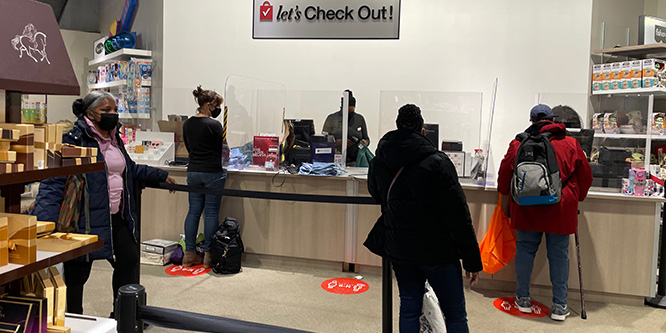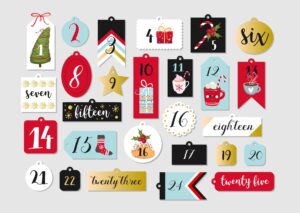
Photo: RetailWire
January 18, 2022
December retail sales were strong, no matter what the clickbait headlines said
Through a special arrangement, presented here for discussion, is a summary of Steve Dennis’ recent Forbes article. Steve is President & Founder of SageBerry Consulting and a senior Forbes Contributor. He is the author of Remarkable Retail: How to Win and Keep Customers in the Age of Disruption.
The U.S. Commerce Department released its monthly retail sales report Friday morning and, within minutes, my social media feed lit up with gloom and doom takes on the alleged sorry state of shopping. Various outlets ran negative headlines suggesting sales in December had dropped precipitously. Much of the reporting focused on results coming in “below expectations.”
There is so much wrong in all of this.
As a senior executive at two Fortune 500 retailers and a consultant/analyst for 30 years, I’m hard pressed to name one person whom I respect who pays much attention to month-over-month numbers. What we focus on is the year-over-year numbers (and more recently, because of COVID, the so-called two-year stack).
Depending on which definition of retail you prefer (some exclude auto, gasoline and/or restaurant revenues), sales were up between 14 and 19 percent year-over-year — much higher than average and a record for the month.
Then there is this whole expectation thing.
I, for one, fully expected December to be lower than November — and so did most other folks in retail I talk to. Why? It’s been obvious supply chain concerns and earlier retailer promotions pulled a lot of holiday sales into October and November. Oh, there’s also a little thing called the Omicron surge.
To be sure, there are reasons for concern. Inflation, supply chain issues, labor shortages, likely higher interest rates and overall uncertainty caused by the pandemic may well dampen future growth. Yet, the affluent consumers that make up the bulk of retail spending, by and large, have excellent balance sheets, buoyed by strong stock and real estate markets and solid discretionary income.
I’m not about to predict that robust sales growth will continue. But the Chicken Little storylines that seem to infuse many media narratives are unfortunately short on both logic and facts when it comes to these reported results.
The year 2021 was both unusual and a blockbuster for most of retail. The future remains volatile, and your mileage may vary, but the idea that December’s retail numbers were weak is utter nonsense.
- December Retail Sales Were Very Strong, Despite The Misleading Headlines – Forbes
- NRF Says 2021 Holiday Sales Grew 14.1 Percent to Record $886.7 Billion – National Retail Federation
- U.S. retail sales plunge in December – Reuters
- Retail sales in U.S. declined 1.9% in December – The Denver Channel
- Retail sales fell in December, a slowdown in a robust holiday shopping season. – The New York Times
- Retail sales dropped 1.9% in December as higher prices caused consumers to curb spending – CNBC
- Warning sign for the economy: Consumers are getting grumpy – CNN Business
- U.S. Retail Spending, Manufacturing Drop as Omicron and Inflation Surge – The Wall Street Journal
Discussion Questions
DISCUSSION QUESTIONS: Did December results meet, beat or lag your expectations? What factors do you see as most important in measuring holiday results?
Poll
BrainTrust
Nikki Baird
VP of Strategy, Aptos
Rachelle King
Retail Industry Thought Leader
Recent Discussions







This has been a bugbear of mine for many years. The reporting by the Census Bureau and, by extension, the media that pick up the figures is abysmal. There are two issues. First, the headline numbers are reported month-over-month, which is meaningless. Seriously, what retailer compares one month to the next? Second, the figures are reported seasonally adjusted which is an often inaccurate statistical manipulation of what happened. That is why you get headlines which say December was a bad month when, in reality, it was the biggest December on record. What’s absurd is the narrative is so out of step with the reality on the ground that it makes all the negative commentary laughable!
Bravo Steve – I couldn’t agree more. Given the tumult and challenges retailers have faced, the results for many this holiday season were nothing short of terrific. The fact is, the retailers who survived the ravages of the pandemic have emerged stronger, driven by a robust economy. Sure inflation is inevitable, but it’s not a deal breaker. Notwithstanding the still unfolding and uncertain trajectory of the COVID-19 pandemic and lingering supply chain concerns, 2022 is setting up to be a solid year, with even bigger gains in 2023.
UGH! What does it take to kill this “month over month” thing in retail? That has never had any meaning, ever, and yet whenever there is an opportunity to use it to say something negative it gets splashed everywhere. This year’s holiday season was AMAZING. Even better than 2019, at least among our customers. This month over month stuff has to be killed – killed as dead as the idea of spinning off dot-com businesses to “unlock value”!
Amen to both. And as to the second idea – spinning off dot-coms, what they really want to do is unlock the value of the real estate – like Macy’s in Herald Square. It’s actually disgusting.
With regard to the first, you know I’ve been joining with you in railing against this since the NRF and the Chamber of Commerce started this game. It’s actually business 101 — it’s the reason why businesses get seasonal lines of credit, it’s the reason why we look at cash over the year, not month by month. What part of “retail is a seasonal business” don’t these entities understand? Feh.
Amen to Nikki and Paula. And the idea of getting rid of your online business to “unlock value” is utterly absurd.
Complete agree with Paula, Nikki and Cathy — 2021 was a crazy year that didn’t follow normal seasonality rules anyway. Take a look at April numbers! More important, these have been the highest ever retail sales from previous years — with the highest growth in decades. YOY it’s been the best year ever, and across Q4 2021, the best retail holiday season ever. If you have to look at MOM numbers (Source:NY Times):
Nov 2019: $522.8B Dec 2019: $523.9B (0.2% growth MOM)
Nov 2020: $542.6B Dec 2020: $536B (-1.22% growth MOM)
Nov 2021: $639.1B Dec 2021: $626.8B (-1.92% growth MOM, but 16.3% YOY)
Seasonality suggests earlier retail sales that are spread across December. You still have to remember, December has fewer shopping days and the new trend of a slight dip in December from 2020 has carried through to 2021 — not that it was much different in 2019 (only 0.2% growth). Regardless, the overall numbers show dramatic increase in overall sales for 2021, the holiday season for 2021, and for December 2021, with double digit growth.
Remember — we had a supply chain shortage, an Omicron virus surge, and staffing shortages across retail. These retail numbers are phenomenal.
Retail sales were strong and retailers/brands have been working smarter and better to get closer to the customer. This is great news. Retailers are changing the way they retail and now we need to change the variables on how we measure success.
Let’s look at the season in its entirety and get rid of month over month. It’s short sighted. And it’s incorrect. It’s also discouraging.
We should be thinking about KPIs in a manner of getting faster to market with the right product at the right time and in the right channels. Let’s look at product longevity and sustainability metrics. Let’s review how retailers are deepening customer relationships and vendor partnerships.
December absolutely beat my expectations. I thought that the combined dynamic of sales being pulled forward and so called “lean” inventories would surely put a damper on December sales. And yet records were set. So we have robust, healthy sales on lean inventories (remains to be seen just exactly how lean). I hope that’s a powerful lesson for retailers who have for years been participating in, if not pushing, a downward promotional spiral. Turns out we can have healthy sales and improved margins on leaner inventory. OK, so demand in December was not just robust, it was really robust. And when demand is not quite so robust, will more inventory boost demand? NO! Differentiated product, great execution and a powerful Explore + Experiment = Experience offering will give the retailer the edge they are looking for.
With the extension of the holiday shopping season ranging between the end of October and the end of December, the month-to-month comparisons are meaningless. It’s the totality of the shopping season where we should be making any comparisons to LY and LLY. With so many macroeconomic challenges, the lingering pandemic, supply chain disruptions, and overall uncertainty, it was encouraging to see that we had excellent results coming out of Q4.
The unfortunate clickbait “retail is in trouble” narratives do not help an industry that has proven to be resilient, determined, and adaptive in challenging times. Retailers should undoubtedly take a cautious approach to their Q1-Q3 forecasts as plenty of turbulent times and disruptions are ahead. However all is not lost, and those retailers that execute against their brand promise will continue to be successful.
I like the characterization of “Chicken Little storylines.” This has been an ongoing issue since the days of the so-called “Retail Apocalypse” that never happened. Month over month reflects a very shortsighted view of the overall health of the industry.
Reading the business press in October we were told to expect empty stores, Christmas was cancelled and spending was going to tank. And here we are looking back on another successful year in the industry. The leaders continue to turn in record performances. Were there hiccups? Sure, it’s business. But by and large our industry experienced another successful year. I’m reminded of the Larry Fink letter from Blackrock a few years ago decrying quarterly reporting. Stop thinking short term: it’s not good for investors, it’s not good for business.
As a retailer, I have never looked at month over month sales numbers – it doesn’t give an even comparison. This past season was a good season, and this year looks to be even better.
No one does. Ever.
After reading all the thoughts about how retail handled the season from all the experts, I have to say I am proud of the efforts, ingenuity and success the retail world created. And I am truly inspired by their efforts to keep plowing — and they did plow, while keeping their staffs, their operations and their attitudes going at full power, pulling out their best efforts with attitudes that didn’t fail them. Yes, I lost sleep for them, but most still flowed through despite their challenges. Bravo!
Before I even saw that he authored this piece I knew I was going to quote Steve Dennis’s Forbes article: “December 2021 was the best December in the history of retail.” IN THE HISTORY OF RETAIL. Come on, that’s big news! Too bad it wasn’t.
Plenty of media outlets find joy in reporting abysmal things about retail. That’s not going to change because clickbait headlines bring in readers. I think it’s up to us – the strategists, speakers, consultants – people who actually work in the industry, to change the narrative because the mainstream media has already proven that it won’t.
I publish a lot of U.S. Dept. of Commerce data. It’s a really useful toolset, but like all data can be wildly misused and misunderstood.
The top line is that 2021 was a monster year in retail and holiday was no exception. There were clear winners and losers, but as a whole the industry totally crushed it.
Total retail sales for November and December were $1.2 trillion, which is 16.1% growth from 2020 (the highest sales and fastest growth since at least 1992). U.S. Commerce Advance Monthly Sales, NAICS category 44000 (all retail sales including gas and autos which NRF usually filters out, but not including restaurants). Un-adjusted for seasonality (because why would you).
Let’s do a quick poll (just for fun): Who do you trust less?
a) politicians
b) pharmaceutical companies
c) the media who reports on retail
Sure, they all have their upside every now and then. But when the media gets grouped with the other two, it tells you pretty much all you know about how well they are doing their job when reporting on retail (and, lots of other topics too).
Bad news sells, unfortunately. I often say the best thing that could happen to retail is for the media to go away.
Finally, the gas-lighting headlines about how depressed retail is has been fact checked. December is not the holiday season. The season can run all of Q4, especially if you factor is smarter, earlier shopping to mitigate supply chain shortages, shipment delays and trying to stay clear of a deadly virus.
Consumers adjusted according to realtime circumstances–as they always do. If you manage a P&L and made your number for the year, despite month-to-month fluctuations and a global pandemic; in retail, we call that a good year.
Though I don’t disagree with Steve — either as to his general message or specific points — it also seems a little bit of the gentleman doth protesteth too much: yes, of course it’s wrong to pay much attention to month-to-month swings … be they bad or good. It’s also good to remember that, due to inflation and population growth, the economy (usually) grows over time … which of course needs to be considered when analyzing results.
We had a supply chain shortage, an Omicron virus surge, and staffing shortages across retail and retail still achieved the highest ever sales in the US for the year, for the quarter (q4) and for the month. I’m surprised firms like Reuters could call the 1.9% drop in Nov-Dec sales a “plunge.”
I do not have a rosy opinion of holiday sales in 2021 and on the outlook for retail in 2022. First, sales were inflated due to 7% inflation. Second, retailers should have seen the supply chain issues approaching nearly a year ago as factories shut down. Third, the current economic outlook is presenting comp challenges as stores were reopened Q1 2021 and stimulus packages flushed cash into the disposable spending pool. This coupled with the tax reform impacts will put even more pressure on retailers.
Only those brands who are willing to abandon their old plans and pivot to the new market/consumer will scale. Retailers must reinvent themselves from the inside out by addressing a more diverse sourcing model, creating transparency in the supply chain and investing in smart technology to fully accelerate their omni-strategies across channels and platforms.
I agree with Steve. The December figures do not accurately reflect the store’s real conversions. Target, Best Buy, and Costco are a few examples. Holiday sales increased by 14-18 percent at Target, Best Buy, Costco, and other major retailers.
Quite a lot of factors determine holiday results. To begin with, a retailer’s ability to meet current customer expectations is a critical component in deciding holiday sales. Another factor is retailers’ digital capabilities and how they provide a seamless purchasing experience in-store. How efficiently retailers are escalating between physical and digital channels also plays an important factor. Lastly, demand distribution by customers also causes changes in figures. To say, this time, many customers started shopping much before the holiday season to avoid the rush. This should be included in the computation as well.